
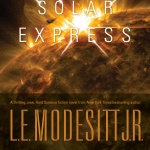 Solar Express
Solar Express
By L.E. Modesitt, Jr. (review is of the print)
Publisher: Tor Books
Publication Date: November 2015
Themes: / space opera / military sci-fi / alien artifacts / science fiction /
Publisher summary:
You can’t militarize space. This one rule has led to decades of peaceful development of space programs worldwide. However, increasing resource scarcity and a changing climate on Earth’s surface is causing some interested parties to militarize, namely India, the North American Union, and the Sinese Federation.
The discovery of a strange artifact by Dr. Alayna Wong precipitates a crisis. What appears to be a hitherto undiscovered comet is soon revealed to be an alien structure on a cometary trajectory toward the sun. Now there is a race between countries to see who can study and control the artifact dubbed the “Solar Express” before it perhaps destroys itself.
Leading the way for the North American Union is Alayna’s friend, Captain Christopher Tavoian, one of the first shuttle pilots to be trained for combat in space. But, as the alien craft gets closer to its destination, it begins to alter the surface of the sun in strange new ways, ways that could lead Alayna to revolutionary discoveries-provided Chris can prevent war from breaking out as he navigates among the escalating tensions between nations.
This is an unusual book to review, since it feels unstuck in time. On the one hand, it reads like a mid-20th-century science fiction adventure, with heroic pilot and astronomer successfully solving space problems. On the other hand, it earnestly points a century ahead, to a world built from concerns very prominent in 2015.
Solar Express is about an object hurtling across the solar system during the year 2114. Two main characters engage with it, and with each other. The astronomer, Alayna Wong-Grant, works in a lunar observatory by herself, and discovers what seems like a comet. The pilot, Chris Tavoian, is tasked with exploring it. Much of the novel’s dramatic power comes from the interaction of these three, who nearly never touch each other.
The setting looms large. The world of 2114 is dominated by an East Asian polity, the Sinese republic (I think), in competition with a rising India and a sidelined North American entity (the US plus Canada, maybe including Mexico). The 21st century saw climate change occur, along with several bad wars, so there’s a touch of post-catastrophe in the staging. 2114 also sees Sinese-Indian competition rise to the brink of war, which should have added more dramatic punch to the novel than it actually did.
I began these notes by mentioning older sf, because my reading was haunted by many ghosts. Arthur C. Clarke’s great Rendezvous with Rama hovered over every page, as a humans try in vain to make sense of a cryptic alien artifact headed towards the sun. The super-competent pilot felt like a time traveler from the 1940s or 50s, as he successfully lands a plumb assignment, conducts geopolitical analysis, pilots expertly, investigates an alien machine, deals with foreign forces, deals with them again, and survives physical extremity.
That competence actually dragged down the middle third of Solar Express for me. It seemed like Tavoian’s explorations occurred at a snail’s pace, with a lot of repetition (performing similar tasks, writing to people in order to describe what we’ve just seen) and very slow progress.
The world-building wasn’t as successful as it could have been, as I noted above. For one we get too many historical observations from main characters discussing the present. People have a fondness for early 21st century history, which doesn’t make a lot of sense in that world – i.e., there’s no sense that people are history obsessives personally (as in many Poul Anderson stories) or culturally (check Harrison’s Centauri Device for an example) (57, 67, 130, 156, 232). Example: “Or [a person] believes that God in on their side. Like the Taliban in Pakistan seventy years ago.” (130) That’s an awkward reach to the reader. Imagine if a novel taking place in the present had characters in daily life – not historians – constantly referencing the War of 1812. Some of the non-narrative documents do a better job, including a kind of news + scandal sheet and selected articles.
Speaking of history, the world’s rush to war was a powerful context for the alien express, again reminding me of Arthur C. Clarke (2010 this time), but it played out oddly. The great powers confrontation is set up nicely about a 100 pages in, then ratchets up too slowly, with too much repetition (India threatens to use killer missiles, the North American president advises calm). We don’t get much insight into the crisis and its logic, perhaps because of our two-character focus.
The romance was gently handled, as each character has a lot on their plate. Besides their major work, each faces a family crisis at a distance. Astronomer and pilot have a geeky correspondence habit of exchanging political quotes with each other, the tenor of which reveal a grumpy, rather conservative outlook, which just lightly interacts with the rest of the plot.
And yet I enjoyed myself. I love stories of space adventure, and was fascinated by how this one played out. I wanted to see the alien artifact, to learn how the Sinese were responding, and what the heck was going on with the sun. Again, like a mid-20th-century sf novel, I was engaged.
As a work of hard science fiction, Solar Express is unapologetic. Like The Martian this novel zeroes in on science and technology challenges, from air filtration to spectroscopy to cleaning up lunar dust to the details of orbital mechanics. Check the jaw-dropping opening paragraph, which is a kind of dare or gauntlet hurled at the reader, starting off with a nearly 300-word first line about the physical and administrative (!) details of the moon base. Or read how the title first appears:
But by the time this object nears Mercury, it will be traveling at somewhere in the range of sixty lays per second, accelerating to as high as 250 by the time it reaches perihelion… a real solar express. (142)
Modessit does well pedagogically on this front, giving us detailed information, incremental developments, discussions, and solutions, while not stooping so low as to introduce many concepts.
So…. recommended as a fun read for people interested in hard sf and/or with a love of mid-20th-century space adventure stories. Not recommended for people who don’t read science fiction.
Posted by Bryan A.
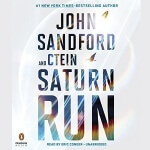 Saturn Run
Saturn Run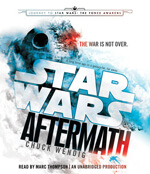 Aftermath: Star Wars (Journey to Star Wars: The Force Awakens)
Aftermath: Star Wars (Journey to Star Wars: The Force Awakens)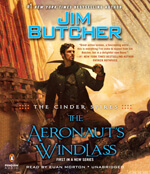 The Aeronaut’s Windlass (The Cinder Spires #1)
The Aeronaut’s Windlass (The Cinder Spires #1)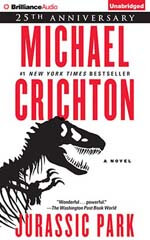 Jurassic Park
Jurassic Park (the hipster’s T-Rex)
(the hipster’s T-Rex)


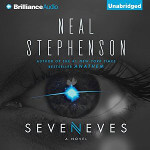 Seveneves
Seveneves